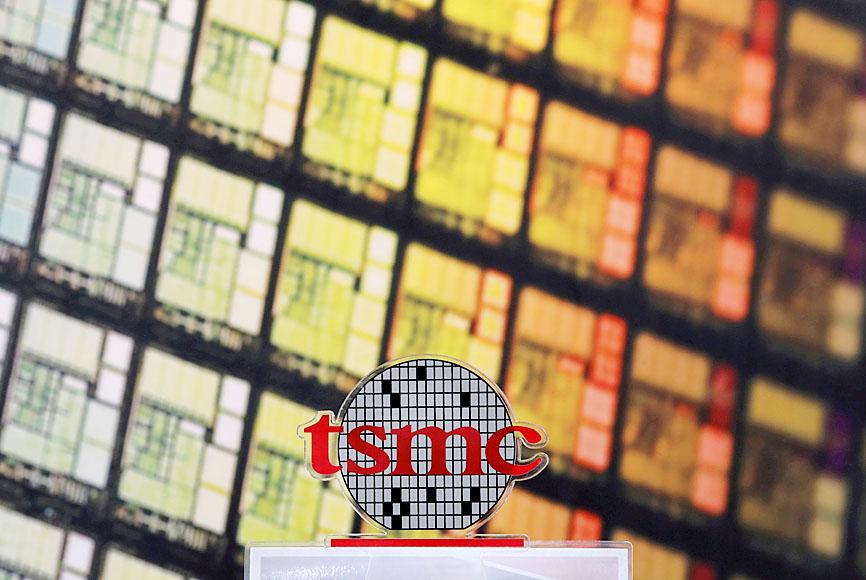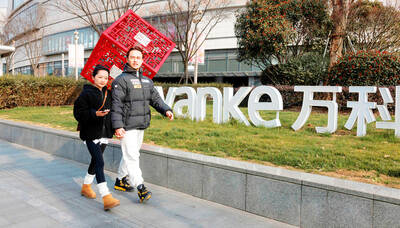The global semiconductor supply chain is to see a transformation, spearheaded by the US government’s move to tackle chip shortages and safeguard its economy, which would benefit semiconductor foundries, including Taiwan Semiconductor Manufacturing Co (TSMC, 台積電), Fitch Ratings said yesterday.
The US Innovation and Competition Act (USICA), endorsed by the White House and passed by the Senate, would allocate large-scale funding for domestic chip production to alleviate supply chain crunches and ensure dependable semiconductor sourcing. The bill is awaiting passage by the US House of Representatives.
Leading chip makers such as TSMC, South Korea’s Samsung Electronics Co and the US’ Intel Corp would be the biggest beneficiaries due to their specialty in producing leading-edge nodes, Fitch said.

Photo: Tyrone Siu, Reuters
The windfall would extend to capital equipment suppliers such as KLA Corp and ASML Holding NV for supplying the tools used in the production of advanced chips, Fitch said.
The bill is intended to boost global competitiveness in industries deemed critical, with US$250 billion of government investment, it said, adding that about US$52 billion is to fund semiconductor research, design and manufacturing initiatives.
The US Department of Commerce expects the policy to unlock private investment, resulting in US$150 billion or more in funding for seven to 10 new US-based factories.
Several firms have announced expansion plans in the US. TSMC has announced a US$12 billion plan to build a 5-nanometer plant in Arizona, with media reports saying it is mulling up to five additional plants. Intel expects to invest US$20 billion in two new manufacturing facilities in the same state and Samsung intends to spend US$17 billion on a new 5-nanometer plant in Austin, Texas.
US policymakers view the semiconductor industry as strategically important because it supplies the fundamental enabling technologies for advanced defense, communications, big data and artificial intelligence among other industries, Fitch said.
The ongoing semiconductor shortage, driven by a confluence of factors, including inadequate capacity and stronger-than-expected demand, has highlighted supply chain vulnerability, it said.
The predicament also underscores the need to secure a dependable source of semiconductor components as the US’ share of semiconductor production has declined to about 12 percent from 37 percent in 1990, it said.
The global chip shortage has enhanced the bargaining position of foundries, Fitch said, adding that TSMC recently announced price increases of up to 20 percent.
Some chip consumers are making upfront payments to secure supply, Fitch said.
Electric vehicle maker Tesla Inc is expected to pay in advance to secure capacity, while Apple Inc has reserved TSMC’s initial capacity of 4-nanometer for its latest generation MacBook, it said.
TSMC supplies 50 to 55 percent of global semiconductor output and is the only foundry capable of turning out 7-nanometer and even more advanced chips, which enable everything from the latest smartphone models to graphics processing units used in data centers and artificial-intelligence applications.
TSMC’s operations are primarily centered in Taiwan, resulting in heightened geographic concentration risks, as earthquakes, droughts and blackouts have challenged manufacturing, Fitch said.
Ongoing droughts have the potential to affect TSMC’s production volume, as it uses 63,000 tonnes of water per day, it said, adding that Taiwan is also dealing with a COVID-19 outbreak.

CHIP RACE: Three years of overbroad export controls drove foreign competitors to pursue their own AI chips, and ‘cost US taxpayers billions of dollars,’ Nvidia said China has figured out the US strategy for allowing it to buy Nvidia Corp’s H200s and is rejecting the artificial intelligence (AI) chip in favor of domestically developed semiconductors, White House AI adviser David Sacks said, citing news reports. US President Donald Trump on Monday said that he would allow shipments of Nvidia’s H200 chips to China, part of an administration effort backed by Sacks to challenge Chinese tech champions such as Huawei Technologies Co (華為) by bringing US competition to their home market. On Friday, Sacks signaled that he was uncertain about whether that approach would work. “They’re rejecting our chips,” Sacks

Taiwan’s long-term economic competitiveness will hinge not only on national champions like Taiwan Semiconductor Manufacturing Co. (TSMC, 台積電) but also on the widespread adoption of artificial intelligence (AI) and other emerging technologies, a US-based scholar has said. At a lecture in Taipei on Tuesday, Jeffrey Ding, assistant professor of political science at the George Washington University and author of "Technology and the Rise of Great Powers," argued that historical experience shows that general-purpose technologies (GPTs) — such as electricity, computers and now AI — shape long-term economic advantages through their diffusion across the broader economy. "What really matters is not who pioneers

BUBBLE? Only a handful of companies are seeing rapid revenue growth and higher valuations, and it is not enough to call the AI trend a transformation, an analyst said Artificial intelligence (AI) is entering a more challenging phase next year as companies move beyond experimentation and begin demanding clear financial returns from a technology that has delivered big gains to only a small group of early adopters, PricewaterhouseCoopers (PwC) Taiwan said yesterday. Most organizations have been able to justify AI investments through cost recovery or modest efficiency gains, but few have achieved meaningful revenue growth or long-term competitive advantage, the consultancy said in its 2026 AI Business Predictions report. This growing performance gap is forcing executives to reconsider how AI is deployed across their organizations, it said. “Many companies

China Vanke Co (萬科), China’s last major developer to have so far avoided default amid an unprecedented property crisis, has been left with little time to keep debt failure at bay after creditors spurned its proposal to push back a looming bond payment. Once China’s biggest homebuilder by sales, Vanke failed to obtain sufficient support for its plan to delay paying the 2 billion yuan (US$283.51 million) note due today, a filing to the National Association of Financial Market Institutional Investors showed late on Saturday. The proposal, along with two others on the ballot, would have allowed a one-year extension. All three